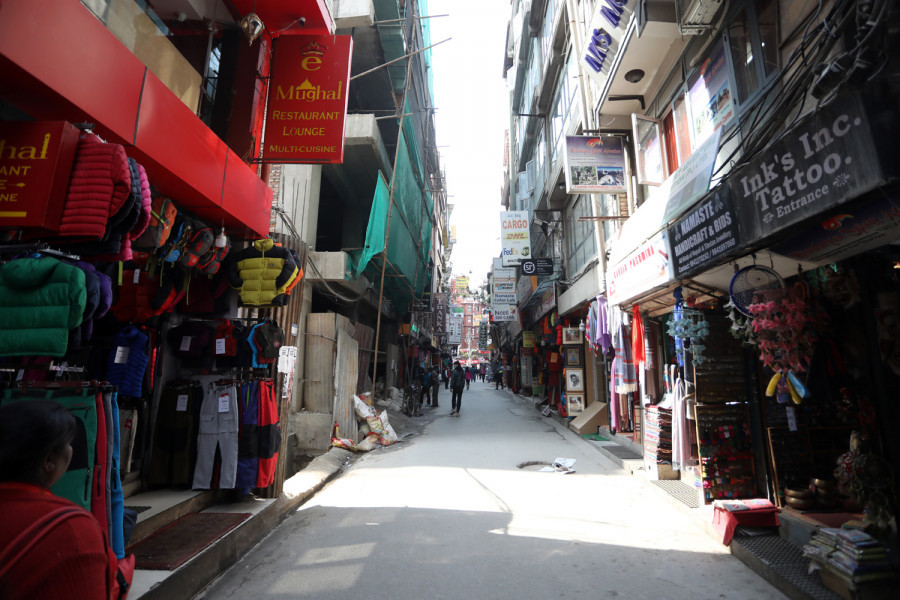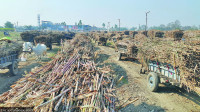Money
Pandemic derails country’s economic recovery, Nepal Rastra Bank survey suggests
Economists and business people have urged the government to implement economic recovery programmes to lift the faltering economy.
Prithvi Man Shrestha
The country’s economy does not appear to be on track to prompt recovery. A central bank survey has shown that production and transactions of various economic sectors remain less than 50 percent of the pre-Covid-19 time.
Results of the follow-up survey conducted by the central bank in November show that production and transactions of various economic sectors — agriculture, industry and services, among others — stand at 47.99 percent of their usual production and transactions before the pandemic.
The results are based on responses from 316 enterprises from across the country. Earlier, the central bank had conducted surveys among 674 industries in June and July, whose results were unveiled in August.
In the earlier survey, 97 percent of the respondents had said that their production and transactions slumped by 74 percent due the Covid-19 pandemic and the subsequent four months long lockdown in the country.
“The latest survey results suggest that even after the lockdown was lifted, economic activities continue to remain sluggish,” said Gunakar Bhatta, spokesperson at the central bank. “We need to make more efforts to take the production and transactions of various industries to pre-Covid-19 level.”
Various international agencies have projected meagre to negative economic growth for Nepal in light of the pandemic that has upended the economy worldwide.
In October, the World Bank stated that Nepal’s economy could grow by just 0.6 percent in the current fiscal year 2020-21.
Earlier, the same bank had projected that Nepal’s economy could shrink by 2.8 percent.
Citing an unpublished report of the government’s task force, Kantipur, the sister publication of the Post, had also reported the country’s economic growth by 0.6 percent this fiscal year.
“The central bank’s survey, unpublished report of the government’s task force and the World Bank’s projections all point to the fact that the economy is yet to recover from the severe impact of the pandemic,” said Shankar Sharma, former vice-chairman of National Planning Commission.
According to the central bank’s latest survey, the real estate and rental services have suffered the worst impact followed by the hotels and restaurant sector.
The transactions of the real estate and rental services stood at just 15 percent of normal time before the pandemic. Businesses of hotels and restaurant sector was just 16.72 percent of the pre-Covid-19 period in November.
“Even though the real estate sector appears to have suffered the worst, we need to be more concerned about the status of the hotels and restaurant sector which creates many jobs and is tied to the other sectors like agriculture,” said Bhatta.
The government allowed resumption of hotels and restaurants starting from July 30 by following a proper health and safety protocol. However, the sector continues to suffer because of limited movement of people and lack of tourism activities.
“In the absence of foreign tourists, domestic tourism could give some relief to the hotels and restaurants. The government had announced a programme to promote domestic tourism through the budget six months ago, but it has not been implemented yet,” said Binayak Shah, first vice-president of Hotel Association of Nepal.
It took nearly six months for the government to announce a relief package of Rs50 billion for implementation after the budget announcement. And its working procedure was endorsed only in late November.
The package aims to provide funds to micro, small and medium enterprises, as well as tourism industry at cheaper interest rate of five percent to pay staff salary and to finance their working capital.
Sharma, the former vice-chairman of National Planning Commission, said that the government’s failure to give relief to businesses in time and its failure to implement employment-centric programmes also affected the overall economic growth prospect.
The government has allocated Rs11.6 billion for the Prime Minister Employment Programme, which aims to create 200,000 jobs this fiscal year. According to a government task force report, as many as 1.56 million jobs were lost due to the pandemic.
According to the central bank study, businesses of education, communication and health services remained most affected in November after the real estate and hotel and restaurant sectors.
According to the survey, their businesses remained well below 40 percent of pre-Covid-19 era. Many schools across the country are yet to reopen after they were closed in March.
The businesses of electricity, gas and water are among the relatively better performing sectors. Their businesses stood at 92.5 percent of the normal times.
The transportation sector is also improving after the government lifted the travel restrictions, particularly long-haul overland transportation services, from mid-September. The business of transportation sector in November stood at 72.86 percent of the pre-Covid-19 time, the survey results show.
Production of the agriculture and manufacturing sector stood at 69.69 percent and 61.32 percent of normal times before the pandemic.
“The production of the agriculture sector is expected to remain stable even though farmers faced shortage of chemical fertilisers this year,” said Sharma.
The Agriculture Input Company recently scrapped two contracts signed with a supplier.
Manufacturing industries too are facing the economic brunt of the pandemic as their production output and supply chain continues to be disrupted or limited.
Experts and industrialists say that that government could take some moves that could help revive the economy to some extent, if not fully.
Sharma said that if the relief measures announced by the government is implemented promptly, it could help revive the economy to some extent.
“The government should also make an utmost effort to increase the capital budget which will help create demands of construction materials and create employment,” he said.
As of Friday, capital expenditure of the government just stood at nine percent, according to the Financial Comptroller General Office, which keeps record of the government income and expenditure.
For the hotel industry, the government needs to take confidence building measures to promote domestic and international tourism, said Shah, of the Hotel Association Nepal.
“The government should ensure that insurance companies compensate if someone having insurance coverage is infected with a virus,” he said.
“The government should also conduct PCR tests of foreign tourists right after they arrive at the airport and give a report the next day. There should also be a dedicated hospital for foreign tourists who are found infected upon arrival in Nepal,” said Shah.




 8.69°C Kathmandu
8.69°C Kathmandu













